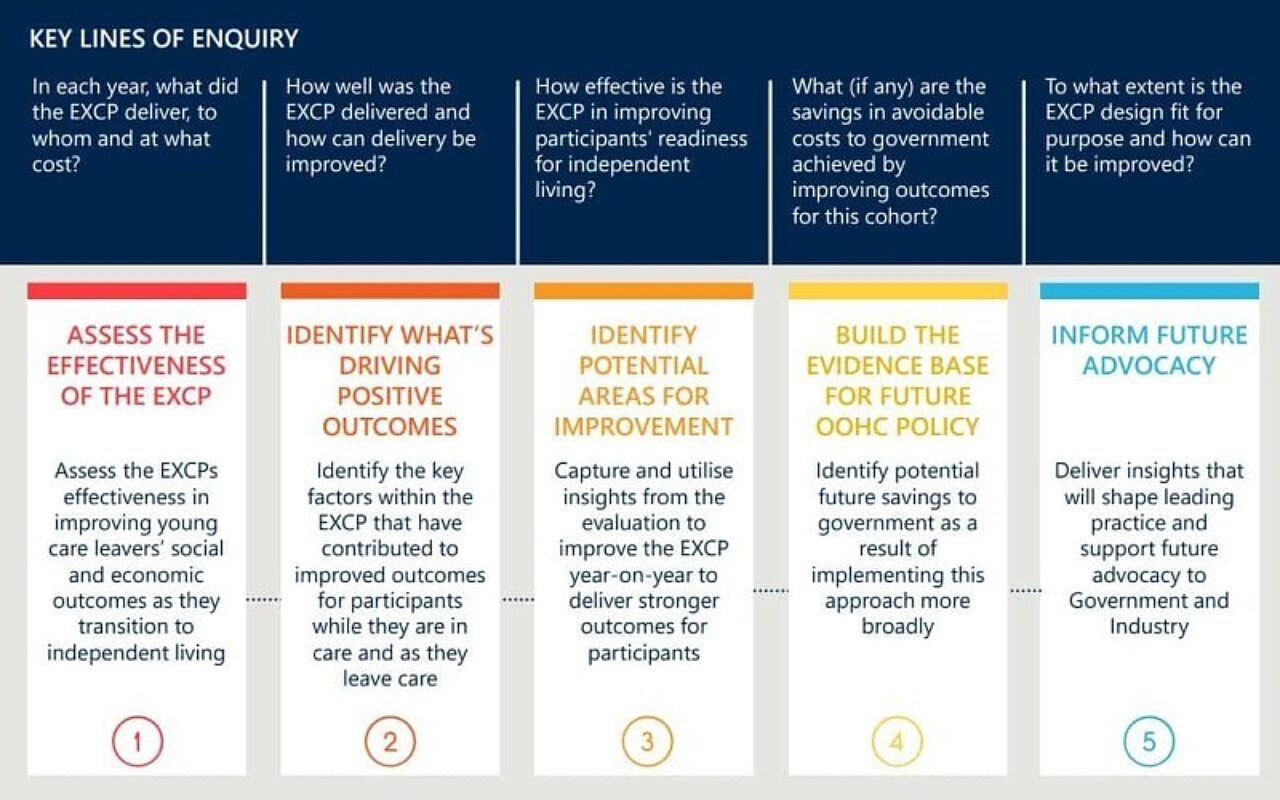Uniting wanted to improve outcomes for young people in out-of-home care
Uniting NSW.ACT funds the Extended Care Pilot Program (EXCP), which aims to give young people in out-of-home care (OOHC) the same support and opportunity to develop and mature as those not in care.
The program aims to provide young people with support from ages 15 to 21 across five key life domains: housing, education, employment, health and wellbeing, and social connection. Young people are partnered with a Youth Development Coach (YDC), who mentors them to set goals, to build the skills and confidence for independent living, and to leave care feeling safe and confident.
This is coupled with financial and other support to transition to independence, such as the opportunity to continue to live with their carers or access alternative accommodation once they turn 18.
Uniting wanted to understand how effective the program was in improving care leavers’ social and economic outcomes in an effort to advocate for new investment and policy decisions from the NSW Government.
We were engaged to conduct the evaluation, which tracks outcomes and provides ongoing feedback to staff so they better understand how and why the program is or is not achieving benefits and can adjust its programming and support to deliver better outcomes.
We are evaluating the program’s outcomes over six years
Using a mixed-methods approach, the evaluation comprises three stages: setting the direction (2019), generating and communicating insights (2020-2023) and communicating the final outcomes (2024). It is structured through five key lines of enquiry:


During the insights-generation and communication stage, we are:
- analysing program data
- interviewing, surveying and conducting multi-stakeholder workshops with participants, foster carers and staff
- analysing linked secondary data – from NSW Health, the Department of Communities and Justice, the NSW Bureau of Crime Statistics and Research, Centrelink, Medicare and the Pharmaceutical Benefits Scheme – to understand life pathways and service system usage and to calculate savings in avoidable costs generated through improved outcomes for care leavers
- comparing outcomes for EXCP participants with those seen in a similar cohort of young people.
We modified our methodology due to COVID-19, completing all interviews virtually and taking precautions during workshops such as offering virtual options and adhering to physical distancing requirements.
Our recommendations will help Uniting plan for the program’s future
The evaluation is still underway. Our findings to date have indicated that participants are tracking well and, in some instances, appear to be achieving more positive outcomes than other young people with experience in out-of-home care. For instance, participants appear:
- less likely to experience homelessness in the period after leaving care
- more likely to continue studying post leaving school
- more able to access health and wellbeing supports
- better supported to build connections with their community.
The evaluation indicated that the YDCs and the long-term and sustained relationship they build with participants from a young age are a key value-add of the EXCP.
We have made recommendations to Uniting about opportunities for expansion and scale-up to a new cohort of young people in OOHC. A key recommendation is formalising how the EXCP should be structured organisationally to best support participants.
Future evaluation cycles will use linked Australian and NSW Government data to explore participants’ interactions with the health and social services sectors and compare this with other young people in OOHC. The 2021 Progress Report is available now.
In November 2022, the NSW Government announced an investment of $100 million over five years to extend support to young people in out-of-home care to age 21. Uniting drew on our evaluation findings in advocating with government for this change.
What you can learn from Uniting
Young people in OOHC may experience improved outcomes if they are offered specific and tailored and long-term support to transition to independent living.
A pilot program can demonstrate opportunities to scale up and expand access to more people.
A long-term evaluation enables deep insight into a program’s benefits and cost-effectiveness.


